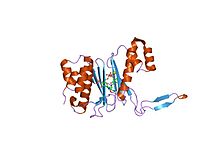Holo-(acyl-carrier-protein) synthase
| phosphopantetheinyltransferase | |||||||||
|---|---|---|---|---|---|---|---|---|---|
 holo-[acyl-carrier-protein] synthase trimer, Helicobacter pylori | |||||||||
| Identifiers | |||||||||
| EC no. | 2.7.8.7 | ||||||||
| CAS no. | 37278-30-1 | ||||||||
| Databases | |||||||||
| IntEnz | IntEnz view | ||||||||
| BRENDA | BRENDA entry | ||||||||
| ExPASy | NiceZyme view | ||||||||
| KEGG | KEGG entry | ||||||||
| MetaCyc | metabolic pathway | ||||||||
| PRIAM | profile | ||||||||
| PDB structures | RCSB PDB PDBe PDBsum | ||||||||
| Gene Ontology | AmiGO / QuickGO | ||||||||
| |||||||||
| ACPS | |||||||||
|---|---|---|---|---|---|---|---|---|---|
 crystal structure of the 4'-phosphopantetheinyl transferase sfp-coenzyme a complex | |||||||||
| Identifiers | |||||||||
| Symbol | ACPS | ||||||||
| Pfam | PF01648 | ||||||||
| InterPro | IPR008278 | ||||||||
| SCOP2 | 1qr0 / SCOPe / SUPFAM | ||||||||
| |||||||||
In enzymology and molecular biology, a holo-[acyl-carrier-protein] synthase (ACPS, EC 2.7.8.7) is an enzyme that catalyzes the chemical reaction:
- CoA-[4'-phosphopantetheine] + apo-acyl carrier protein adenosine 3',5'-bisphosphate + holo-acyl carrier protein
This enzyme belongs to the family of transferases, specifically those transferring non-standard substituted phosphate groups. It is also known as 4'-phosphopantetheinyl transferase after the group it transfers.
Function
[edit]All ACPS enzymes known so far are evolutionally related to each other in a single superfamily of proteins. It transfers a 4'-phosphopantetheine (4'-PP) moiety from coenzyme A (CoA) to an invariant serine in an acyl carrier protein (ACP), a small protein responsible for acyl group activation in fatty acid biosynthesis. This post-translational modification renders holo-ACP capable of acyl group activation via thioesterification of the cysteamine thiol of 4'-PP.[1] This superfamily consists of two subtypes: the trimeric ACPS type such as E. coli ACPS and the monomeric Sfp (PCP-synthesizing) type such as B. subtilis SFP. Structures from both families are now known. The active site accommodates a magnesium ion. The most highly conserved regions of the protein are involved in binding the magnesium ion.[2][3]
Nomenclature
[edit]The systematic name of this enzyme class is CoA-[4'-phosphopantetheine]:apo-[acyl-carrier-protein] 4'-pantetheinephosphotransferase. Other names in common use, disregarding the synthetase/synthase spelling difference, include acyl carrier protein holoprotein synthetase, holo-ACP synthetase, coenzyme A:fatty acid synthetase apoenzyme 4'-phosphopantetheine, acyl carrier protein synthetase (ACPS), PPTase, acyl carrier protein synthase, P-pant transferase, and CoA:apo-[acyl-carrier-protein] pantetheinephosphotransferase.
Structural studies
[edit]As of late 2007, 8 structures have been solved for this class of enzymes, with PDB accession codes 1F7L, 1F7T, 1F80, 1FTE, 1FTF, 1FTH, 2JBZ, and 2JCA.
References
[edit]- ^ Lambalot RH, Walsh CT (October 1995). "Cloning, overproduction, and characterization of the Escherichia coli holo-acyl carrier protein synthase". The Journal of Biological Chemistry. 270 (42): 24658–61. doi:10.1074/jbc.270.42.24658. PMID 7559576.
- ^ Reuter K, Mofid MR, Marahiel MA, Ficner R (December 1999). "Crystal structure of the surfactin synthetase-activating enzyme sfp: a prototype of the 4'-phosphopantetheinyl transferase superfamily". The EMBO Journal. 18 (23): 6823–31. doi:10.1093/emboj/18.23.6823. PMC 1171745. PMID 10581256.
- ^ Marcella AM, Culbertson SJ, Shogren-Knaak MA, Barb AW (24 November 2017). "Structure, High Affinity, and Negative Cooperativity of the Escherichia coli Holo-(Acyl Carrier Protein):Holo-(Acyl Carrier Protein) Synthase Complex". Journal of Molecular Biology. 429 (23): 3763–3775. doi:10.1016/j.jmb.2017.10.015. PMID 29054754.
Further reading
[edit]- Elovson J, Vagelos PR (July 1968). "Acyl carrier protein. X. Acyl carrier protein synthetase". The Journal of Biological Chemistry. 243 (13): 3603–11. doi:10.1016/S0021-9258(19)34183-3. PMID 4872726.
- Prescott DJ, Vagelos PR (1972). "Acyl carrier protein". Advances in Enzymology and Related Areas of Molecular Biology. Advances in Enzymology - and Related Areas of Molecular Biology. Vol. 36. pp. 269–311. doi:10.1002/9780470122815.ch8. ISBN 9780470122815. PMID 4561013.
- Lambalot RH, Gehring AM, Flugel RS, Zuber P, LaCelle M, Marahiel MA, Reid R, Khosla C, Walsh CT (November 1996). "A new enzyme superfamily - the phosphopantetheinyl transferases". Chemistry & Biology. 3 (11): 923–36. doi:10.1016/S1074-5521(96)90181-7. PMID 8939709.
- Walsh CT, Gehring AM, Weinreb PH, Quadri LE, Flugel RS (October 1997). "Post-translational modification of polyketide and nonribosomal peptide synthases". Current Opinion in Chemical Biology. 1 (3): 309–15. doi:10.1016/S1367-5931(97)80067-1. PMID 9667867.
- Mootz HD, Finking R, Marahiel MA (October 2001). "4'-phosphopantetheine transfer in primary and secondary metabolism of Bacillus subtilis". The Journal of Biological Chemistry. 276 (40): 37289–98. doi:10.1074/jbc.M103556200. PMID 11489886.
- Joshi AK, Zhang L, Rangan VS, Smith S (August 2003). "Cloning, expression, and characterization of a human 4'-phosphopantetheinyl transferase with broad substrate specificity". The Journal of Biological Chemistry. 278 (35): 33142–9. doi:10.1074/jbc.M305459200. PMID 12815048.

